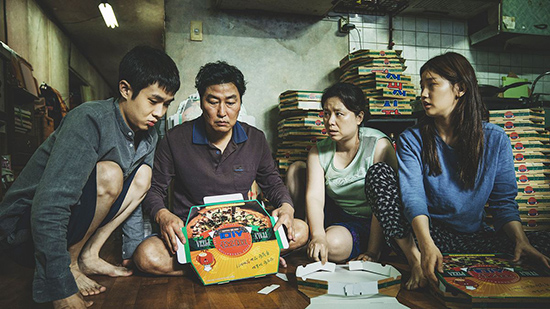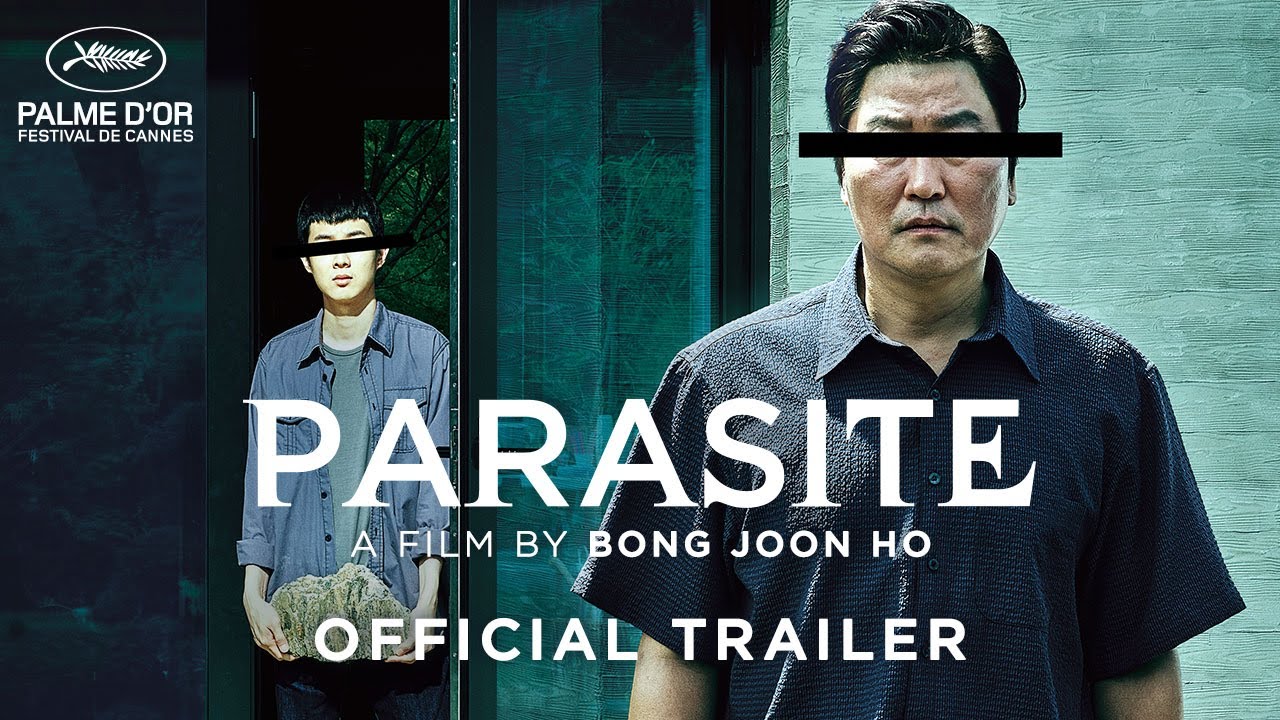It is hot in Locarno in August, and Bong Joon-ho has a small plastic fan positioned under his chin. The propellers are moving, initiated by his thumb on the trigger, and they do not stop for the duration of the interview. It has been under three months since director Bong won the Palme d’Or for Parasite and the film’s star, and frequent Bong collaborator, actor Song Kang-ho is sitting beside him.
Song and I both watch the miniature blades rotate. Bong looks straight ahead. Success is just behind him. How did he feel when he won at Cannes Film Festival? “I went completely blank.” “It felt like a dream. It was overwhelming,” Song adds. Does the shock of achievement suggest a pause in his prolific output? No, apparently. Bong is preparing scripts for two Korean projects. The little windmill keeps whirring.
Bong’s latest feature has united critics, juries, and audiences in a way we might consider uncommon. It received almost universal critical acclaim and jury consensus in Cannes, and since its general release in France the film has become the most ticketed Palme d’Or winner in 15 years. It will represent South Korea at the Oscars, perhaps even in the Best Picture category. That’s a lot of validation. This modern morality tale is set to penetrate the public consciousness. Why?
Parasite is populist political cinema at its most exhilarating and effective. It combines mesmerising set pieces with pointed social commentary. It begins with a poor family consisting of a dishevelled patriarch (played by Song), his wife, his son and his daughter. They live in a bug-infested, subterranean apartment fashioning together pizza delivery boxes for tiny sums and leeching off nearby Wi-Fi hotspots for meagre moments of leisure. They are destitute but resourceful, leaving the window open for the street fumigators. That’ll reach the festering underbelly.
Our proletarian foursome ingratiate themselves with an affluent, picture-perfect family who live in a slick modernist home cloistered in a gated community. They gradually displace the existing house servants through techniques of wilfulness and deception. The son becomes the maths tutor, the daughter the art teacher, the father the driver, the mother the housekeeper. The moneyed clan constitute the unsuspecting mirror image, a symmetrical form at once superficially nicer, more successful, and less cunning than their counterparts. As viewers, we want to see the rich brought low. But be careful to gaze into the abyss, lest the abyss gaze back.
The play of wanton duplicity is fun at first, as we will onwards the group of dishonest ruffians. Yet their comic capering forges sinister consequences. Social cross-pollination between the haves and have-nots comes at a cost: the greater their intimacy, the deeper the rot. Things start to smell. Lights start to flicker. Parasite is about class anxiety and desperation. The movement from comedy to tragedy is linear, which produces less a genre hodgepodge, more a clear and catastrophic descent. This makes it the most formally satisfying of Bong’s films, and the most unsettling.
While in his ecocritical creature movies such as The Host and Okja, Bong throws against the wall an abundance of modes and styles so as to create an abstract expressionist jumble, in Parasite the potency stems from a creeping sense of reality, an uncanny earthiness. You forget the broader, funnier bits. You lose track of who holds monopoly on our sympathies. Bong is telling us: the more you look at monsters, the more you’ll look like them. Our alliances should feel uncertain.
Bong is acutely aware of the effect of his genre-splicing and audience misdirection. “Regardless of genre, sense of humour is like air; it just naturally follows. But in Parasite there is a very painstaking and bitter portrayal, almost a pessimistic reality. Even if it does seem despairing, it was important to share and express the honest feelings so as to be respectful to the audiences.”
At first glance, the film could be interpreted as a national fable. By several indices, South Korea has one of the highest rates of income inequality in the world. Last year’s Burning, a deeply mysterious film from Bong’s contemporary Lee Chang-dong, addresses similar questions about wealth distribution in the motherland. And if Bong’s Snowpiercer held up a relentless train chugging across a ruinous landscape as a metaphor for our doomed, divided humanity, the architectural monument in Parasite appears representative of something more domestically insidious.
Bong suggests he casts a wider net. “You see specific Korean characteristics and situations, but the basic themes are universal. It is about the wealthy and the poor, a polarisation of extremes. This is not only in Korea but internationally. You see it in directors like Ken Loach. In the last few decades, Korea has become an incredibly wealthy country. Consequently the gap has widened, not only in terms of wealth but also psychologically and emotionally. This is a phenomenon that you see elsewhere. Hirokazu Kore-eda is dealing with similar themes in the Japanese film Shoplifters.”
Comparisons with Kore-eda’s 2018 Palme d’Or winner are suggestive. Both contain likeable families driven to pernicious ends by structural inequities. But Bong’s study of social antagonisms incorporates a larger tonal menagerie, and more difficult questions about class solidarity and consciousness. And despite the name check, his is a world away from Loach’s predetermined, grayscale miseryscapes.
I wonder if this universality is what got the film into trouble at China’s FIRST Film Festival, which pulled it at the last minute for “technical reasons” – a widely understood euphemism for censorship. What did they find so provocative?
Bong bounces out of his chair and laughs, “We don’t know!”. He explains, “I’m sure the censors have their own logic and principles. We actually have a Chinese distributor for Parasite. It has been formally acquired so it’s going to be released one day in China.” Past this, he is unwilling to comment on the current diplomatic disputes between the two countries.
As filmmakers, Bong and Song work reciprocally. The latter is effusive toward the former: “Bong is incredibly famous in Korea and he is often described as incredibly nuanced, subtle and thorough in his way of working. But his best capacity is as an artist and this is what really evokes a huge amount of respect; it’s not just his technical capabilities.”
Bong returns the compliment. “I don’t think of it as me directing actors. I’m just entering Song’s world, the vast universe that he occupies. He has a unique rhythm and tempo. Working with Song is something I feel confident in. But it’s important to have new challenges and continue to experiment. The character in Parasite for Song is very different from the detective he played in Memories of Murder and the character Namgoong Minsoo in Snowpiercer. You depart from the same train station, but arrive at different destinations each time and you have to devise different tracks together.”
Song is a distinctive performer who marries melancholy and humour in his roles. Is this torn figure he often presents particular to Korean society? “It may only look that way,” Song offers. “In our own lives we have comedy and tragedy that coexist, and my characters aren’t deliberately manifestations that reflect sociopolitical issues. My focus is what message we are conveying and what is the most precise way to show it, and naturally we have characters with laughter and tears.”
He never trained as a professional actor, which he sees as a blessing. “I don’t think through systematic education you are 100% able to excavate your feelings as an actor. The way to draw out your latent capabilities is through exploring oneself continuously and not letting go of that pursuit.”
On the subject of Netflix, which gave Okja international distribution and caused a ruckus in Cannes two years ago, Bong is assertive. “Something that has been reaffirmed while making Parasite is that films are best watched in the cinema. Cannes and Netflix need to reach a compromise just as Venice has. Cannes must be much more open with what they accept. But Netflix also must be more flexible in terms of being able to release more in cinemas and have screenings earlier.”
Despite presenting gnarly moral questions, Bong’s films often withhold final judgement on their subjects. His characters are all acting within a system, be it late capitalist, neoliberal, authoritarian or demagogic, and their actions are shaped by their will to progress or simply survive.
Parasite pushes these questions to their logical endpoint. “Nobody is 100% good or evil, and all characters have a bit of both and are in the middle grey area,” Bong clarifies. “Despite not having a pure villain, it ends in this extreme, very frightening tragedy. I wanted this to comment on our current times.” He is working in a rich lineage. Tragedies wrought by intimacy and deception, those without obvious villains, are studded throughout art and history.
In his novella Benito Cereno, published in 1855, Herman Melville gives these words to the title character, the displaced captain of a ship:
You were with me all day; stood with me, talked with me, looked at me, ate with me, drank with me; and yet, your last act was to clutch for a villain, not only an innocent man, but the most pitiable of all men.
Benito Cereno is addressing his rescuer, Amasa Delano, who has been deceived by a series of extravagant performances. Slaves have taken control of the ship and to avoid detection retained Cereno as their leader, a silhouette of authority. Cereno’s position is rendered into a façade, and his erratic behaviour arouses Delano’s suspicions until the truth aches to be let out. It is the seminal tale about intimacy and deception, how often one arises from the other, and how difficult it is to locate good and evil in desperate circumstances. But whereas Melville offers the tragedy of the false sovereign, Bong modifies the formula for today, delivering instead the tragedy of the disregarded commoner.
In Parasite, the upwardly mobile set assert themselves within the wealthy abode. But there is something lurking underneath: a reminder of who they are and where they came from. In the basement lies a rejoinder to collective action, social bonds and cultural capital. It recalls an uncomfortable adage about political emancipation, the timeworn truth of class struggle, that no matter how far down you find yourself, you’ll still try and kick the people underneath you. Who, in this case, are the villains?
Parasite is in US cinemas now



